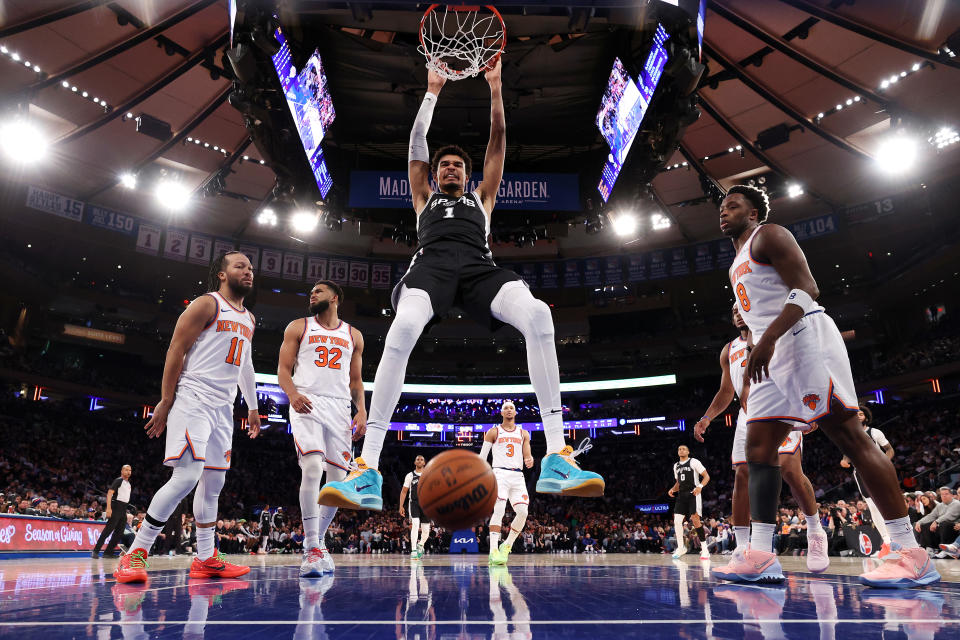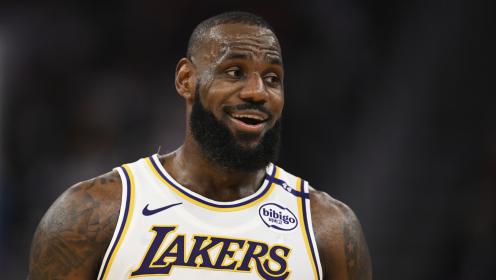NEW YORK — It was the perfect backdrop for the New York Knicks, the league’s king-in-waiting, and the NBA itself.
And Christmas Day, of course.
While the NFL continues to stake claim over territory usually respected and reserved for the NBA, it has the added advantage of every regular-season game meaning something. The advantage the NBA has is a regular-season game feeling like everything in the moment, even if it means less in the 82-game grand scheme.
But for two hours, it can feel like the NBA Finals if the investment is there, especially with the backdrop of Madison Square Garden and desperate Knicks fans.
Victor Wembanyama was majestic, and the Spurs are getting closer to being a team befitting his talent, worthy of consistent attention on the national stage. They looked fun, harnessing athleticism and getting out on the break many times to catch the Knicks off-guard.
“Fun” has never been high on the list of adjectives during their successful eras, but hopefully that changes.
“I thought their approach was great,” said Spurs head coach Mitch Johnson, in the position with Gregg Popovich recovering from a November stroke. “I didn’t feel like it was gonna be too big of a moment. I thought the energy and excitement was in a positive way. I thought they felt they were right where they were supposed to be. And I thought they played like that.”


Wembanyama wasn’t awed by the Garden; in fact, he seemed to rise to the occasion — the only thing missing was a last-second opportunity and the ball being in his hands with a chance to extend the afternoon five more minutes.
Even though he and his teammates couldn’t corral a rebound on the last possession, succumbing to the Knicks’ determination and grit in a 117-114 loss, Wembanyama and the Spurs acquitted themselves on Christmas Day.
Had Wembanyama’s 3-pointer not been called off midway through the fourth because of a foul away from the ball, the future would’ve been the present — the best kind for Adam Silver — as he tallied 42 points, 18 rebounds, four assists, four blocks and many more changed shot attempts.
The 42 was just short of Wilt Chamberlain’s Christmas debut record of 45, but a record doesn’t need to be set to memorialize this occasion.
He’s ready to be showcased, the heir to everything the graybeards are still holding on to. Wembanyama is ready to snatch it away from the stately torchbearers: LeBron James, Stephen Curry and Kevin Durant.
“Tonight just proved, we’re not ready yet,” Wembanyama said. “I’m sure we see that it works, and we’re gonna get addicted to things. It’s high effort, but it’s also high rewards.”
The Spurs aren’t ready, but he is. And the Spurs are .500, nipping at the heels of the older Lakers and Warriors — which means more room to grow this season.
And even though he’s a little more than a week away from being legally able to drink, Wembanyama speaks with a maturity and confidence while being fully aware of the moment, fully embracing an opportunity to announce his candidacy to the world.
He swatted shots so devastatingly it appeared like goaltending, only to be reversed on reviews. There were long-limbed offensive rebounds and follow-up dunks over game defenders who couldn’t help but be helpless to the 7-foot-4 wonder.
“It’s a game of anticipation, trying to read the opponent,” Wembanyama said. “It’s a very interesting part of the game. I get many chances to block guys, but these guys don’t get many chances to make layups against me.”
The temptation is to fantasize about Wembanyama being somewhere else, in a bigger market where a Christmas Day showcase is one of many for the casual fan, to see him on billboards with his arms stretched out, for him to have his Tiger Woods “Hello World” moment.
But there’s nothing wrong with Wembanyama being in San Antonio, or Shai Gilgeous-Alexander being in Oklahoma City, or if the incoming Cooper Flagg ends up in Salt Lake City — young superstars (or presumed superstars in Flagg’s case) being in small markets.
But the old and tired excuse of those well-run franchises not allowing the public to know their transcendent stars shouldn’t be allowed by the league any longer. There are arguments to be made for small markets complaining about advantages of the Los Angeleses and New Yorks, but those same franchises benefit from the revenue jumps provided by the marquee franchises and because of this two-apron system with salaries, the scales will be as even financially as each franchise wants it to be.
So with that said, those franchises can’t play both sides of this. They have to participate in the growth of this league, or at least in keeping the real estate it has in the American lexicon. The NBA can’t afford to have franchises sit on the sidelines, almost resentful of the league office in some circles, while pocketing bread.
There are a lot of withdrawals and not enough deposits into the present and future of the league, and fans won’t invest in new stars unless they feel as if they know them in some way. Behaving as if players are holding state secrets and not in the entertainment business can’t be looked upon as “cute” anymore.
You can’t sell mystery in an 82-game season, not in a widespread way when many fans are already investing hope into their own home markets. Wembanyama is seasoned enough, with all his experience playing in his native France before now, to handle the attention that has swallowed many before him.
Zion Williamson and his body weren’t ready to be the next big thing. Ja Morant is still rebuilding his reputation after his missteps a couple years ago. That leaves Anthony Edwards as an authentic face — and Wembanyama.
The public should get to know Wembanyama, and the NBA should aid and abet in that journey — because it’s critical to figuring out the league’s future.
It’s no secret one reason for the Golden State Warriors’ popularity was not only their excellence on the floor — hint to the NBA: America loves basketball dynasties, not parity — but there was a feeling of proximity to Stephen Curry, Draymond Green, Klay Thompson and, for a spell, Kevin Durant.
We didn’t see the players bare, but as three-dimensional figures with real stories, real quirks and personality — not carefully curated Instagram posts that display a lot but say nothing. The NBA’s gift is the players don’t have helmets and you see them everywhere because it’s an 82-game story waiting to unfold.
But the players have to be characters with character, unafraid of being themselves and not cookie-cutter images they believe corporate America wants — because as we’re seeing, that’s not the case.
It’s not just the game that needs examination, because there are so many extraordinary and versatile athletes doing unimaginable things on a nightly basis, including Wembanyama, who can easily tally 12 blocks and 12 3-pointers in a two-game span like he did against New York and Philadelphia.
There are too many 3-pointers being taken, too much creativity being sapped by the analytics crowd that has too many seats at the table. But beyond that, there are other factors needing attention — or at least acknowledgment by all observers.
Commissioner Adam Silver is in an unenviable spot. Franchise owners paid a mint when more teams seemed to change hands than in any concentrated point in league history. Not only do the owners want to make money and have that guaranteed, but they also want an NFL-like system where they have a chance to win every year.
Having that as a goal, combined with keeping the attention span of itchy viewers, conflicts with each other.
Silver works for the owners, but honestly, he should think of himself as working for the public, because their support and interest keep the game growing — or their disinterest will put Silver in the crosshairs.
Since 2010, 16 teams have changed hands. That’s more than half the league. Even though the late David Stern was still in power then, everyone knew Silver’s time was coming, and the subsequent CBAs were spearheaded by Silver.
It doesn’t seem possible to accomplish every goal, financial and symbolic, but getting close to it requires a deft touch and agreement from all parties on the greater good.
The players certainly haven’t done their part, as everything is tinged with the feeling of “you can’t make me,” with no thought given to how the game grew to the place where exorbitant salaries are the norm and not reserved for the special few.
The players don’t even try in the All-Star Game, and pretend as if we don’t have decades of information that shows players surpassing very low expectations from the league’s marquee weekend.
It’s become imbalanced, and that’s why there’s so much focus on ratings and TV draws and “who’s next?” discussions.
For one glorious afternoon, though, America got to see the long, smirking future — and it’s on the NBA to cultivate Wembanyama’s momentum.
The future depends on it.

